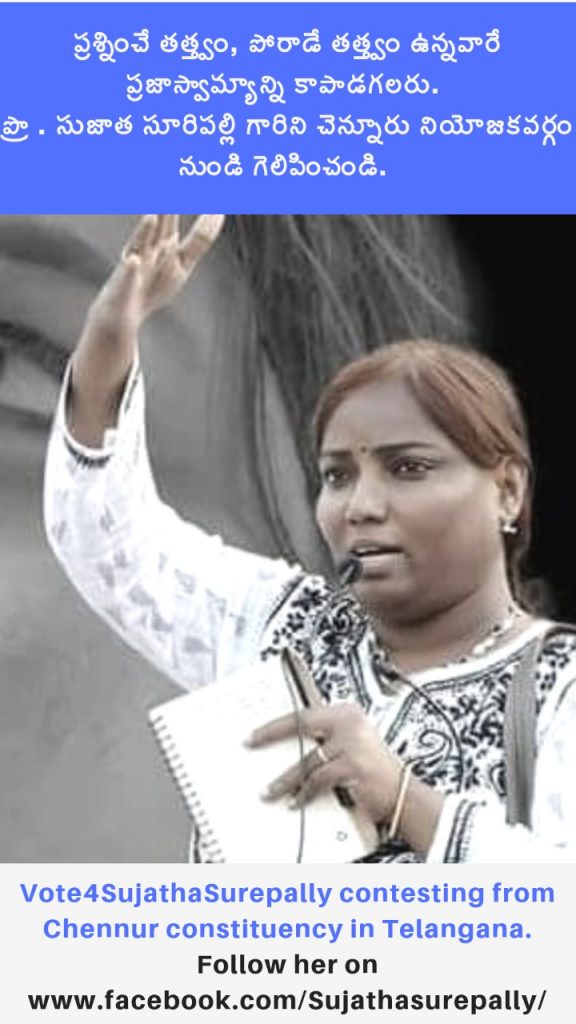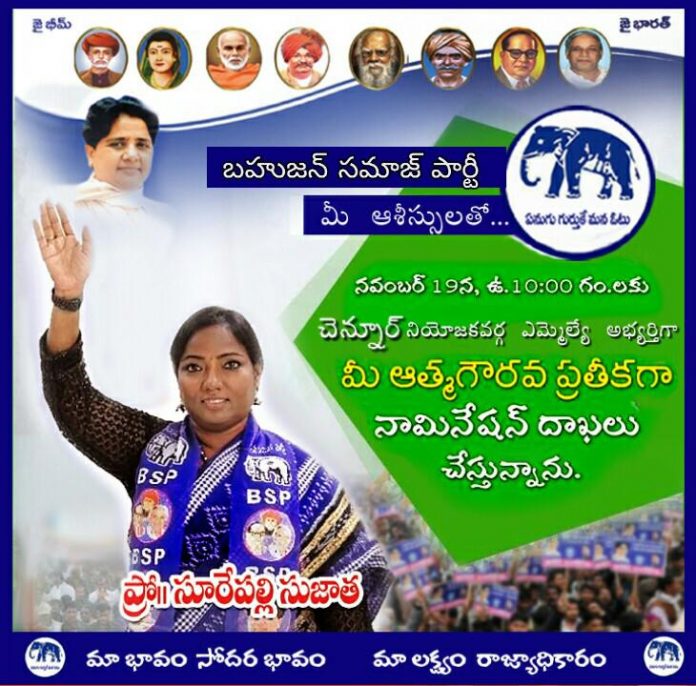By TwoCircles.net Staff Reporter
The year started with casteist trolls, it might just end in the Telangana state assembly for Sujatha Surepally. And for this academic activist from the Dalit community, this seems an apt way to describe her struggles over the past 15 years as she looks to seek mandate from people in Chennur constituency in Komaram Bheem Asifabad District as she lines up against powerful, money-backed candidates.
Surepally is clear that a lot of people stand in her way. “That has always been the case,” she says during a long conversation with TwoCircles.net. With less than two weeks to go, Surepally is against the might of the Telangana Rashtra Samithi (TRS) and Congress as she contests on a ticket from the Bahujan Samaj Party. This is a marked change from her stance just a few months ago, she says, when participating in elections was not even on her mind. It is not in a sarcastic tone that Surepally says “Telangana government and state police” when asked what was the biggest factor that led her to contest elections. Surepally, who has been an activist for over 15 years, has worked on every imaginable issue in Andhra Pradesh and then Telangana. The decision to participate in elections, she says, is a ‘continuation of my movement in the form of electoral politics.’
Associated with left organisations in the past, Surepally also worked actively as a pro-Telangana activist along with working on illegal sand mining, Special Economic Zones, quarrying, etc. However, as Telangana came into shape, it seems the newly-formed state government went even further than the Andhra government in cracking down on dissent. “Over the years, I used to believe that only people related to, say, banned organisations, or someone carrying weapons…cases will be filed against them. All that myth is gone…as an activist, I have worked on so many protest movement related, but no government would dare to question us because all our methods were and remain completely democratic,” she says. “The Telangana government is different,” Surepally, who teaches Sociology at the Satavahana University, adds.
The other, more important factor which led to eventually consider running elections has been her experiences as a Dalit activist. “Post (the formation of) Telangana, I was seriously working on Dalit issues. I found a gap between the radical and left groups also…somehow they were very silent when it came to talking about caste,” she says. “When you are working with one particular caste, even if it is OBCs, all other castes remain silent. If I work with OBCs, I am branded as against other caste groups,” she says pointing out one issue related to temple in Mahabubnagar district where the feud is between OBCs and Dalits. When this issue came up sometime last year, the OBCs in that region were against us,” she says, explaining the many layers of the fight against casteism.
Surepally gives the example of caste killings in Telangana. “They call it honour killing as if only they (non-Dalits) have honour and we don’t…I have seen half a dozen such cases and here is why I thought of politics,” she says. “We do dharnas (protests), demand investigation, read post-mortems, file cases and then they just lie….we run after MPs, MLAs, ministers to lobby for the case…and nothing happens. The media, ministries, parties are all casteist and we need to change that because they clearly are not paying enough attention,” she adds.
Surepally, who was at the forefront of the protests organised by Rohith Vemula, remembers that period well. “I was there at the inauguration of Velivada,” she says. “No political person came to meet and/or address us….now I understand that if your own people are not in these systems (politics, police, ministries, parties) then all your own movements outside are futile. Everyone calls for a people’s movement but we cannot succeed without having a voice in the government.
Surepally says that the current government and police are more interested in pursuing people who fight for these cases instead of addressing the issues. “I wrote an open letter to the Director General of Police during Kathi Mahesh and the Swami Paripoornananda case asking why action was taken only against Kathi Mahesh. I ended up saying that it was because Mahesh was a Dalit that he was being boycotted by the Telangana police. Around 30 people signed the same letter and submitted to the DGP. But one sub-inspector felt that this post created communal disturbance,” she adds. “There are many such cases against me where I am being harassed for no reason,” she adds. “As someone who fights for Dalit issues, I will question state policies whichever government is in place,” she points.

Sujatha says she chose to contest from Chennur because it has a huge Dalit population with a lot of people displaced due to a number of commercial activities. “Power plants, sand quarrying, open cast mining, etc are just a few examples…and to make matters worse, there is abysmal implementation of compensation schemes for people who are already marginalised and extremely poor,” she says.
Coming to the question of contesting from the BSP, Surepally says it was a difficult decision and she had to think long and hard over it. Given that the party has virtually no base in Telangana, it was not an option suggested by many people. “When I saw the political parties and their members, I realised we were reduced to a reserved category. In every other party, the decision-making powers are in the hands of the upper-castes…and even on these seats, only people they want are allowed to contest.
What they do on the ground is irrelevant…last three months were really tough for me. I have seen the struggle first-hand and realise that how difficult it is for someone like me, a Dalit activist without money and political legacy, to contest elections. When I go to BSP office, I saw our people…the office and the party seem a little favorable to my work. The BSP office is diverse…people from various marginalised groups are in the office and you feel like you are between your own people,” she adds. Surepally also believes that by choosing a national-level party she is also trying to rally support and strength for the various issues that plague the Dalit community in the region.
Chennur is one of the 19 SC reserved constituencies in Telangana and has been a Congress candidate historically. For TRS, Pedapalle MP Balka Suman will contest from Chennur and former excise commissioner Borlakunta Venkatesh Netha, also a first timer, will represent the Congress. Interestingly TRS took a controversial decision to not nominate Nallala Odelu, who is a three-time MLA from the constituency.


